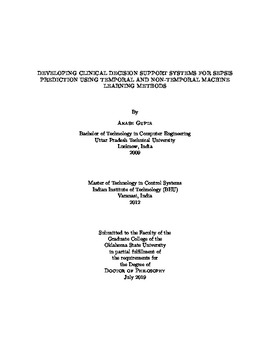| dc.contributor.advisor | Liu, Tieming | |
| dc.contributor.author | Gupta, Akash | |
| dc.date.accessioned | 2020-01-30T15:03:05Z | |
| dc.date.available | 2020-01-30T15:03:05Z | |
| dc.date.issued | 2019-07 | |
| dc.identifier.uri | https://hdl.handle.net/11244/323347 | |
| dc.description.abstract | In healthcare, diagnostic errors represent the biggest challenge to synthesize accurate treatments. In the United States, patient deaths due to misdiagnoses are estimated at 40,000 to 80,000 per year. It was also found that 30% of the annual healthcare spending was consumed on unnecessary services and other inefficiencies. The diagnostic errors could be reduced, and public health can be improved by applying machine learning and artificial intelligence in healthcare problems. This dissertation is an attempt to formulate clinical decision support systems and to develop new algorithms to reduce clinical errors. | |
| dc.description.abstract | This dissertation aims at developing clinical decision support systems to diagnose sepsis in the early stages. The key feature of our work is that we captured the dynamics among body organs using Bayesian networks. The richness of the proposed model is measured not only by achieving high accuracy but also by utilizing fewer lab results. | |
| dc.description.abstract | To further improve the accuracy of the clinical decision support system, we utilize longitudinal data to develop a mortality progression model. This part of the dissertation proposes a hidden Markov model (HMM) framework to model the mortality progression. In comparison to existing approaches, the proposed framework leverages the longitudinal data available in the electronic health records (EHR). | |
| dc.description.abstract | In addition, this dissertation proposes an initialization procedure to train the parameters of HMM efficiently. The current HMM learning algorithms are sensitive to initialization. The proposed method computes an initial set of parameters by relaxing the time dependency in sequential time series data and incorporating the multinomial logistic regression. | |
| dc.description.abstract | Finally, this dissertation compares the prognostic accuracy of two popularly used early sepsis diagnostic criteria: Systemic Inflammatory Response Syndrome (SIRS) and quick Sepsis-related Organ Failure Assessment (qSOFA). Using statistical and machine learning methods, we found that qSOFA is a better diagnostic criteria than SIRS. These findings will guide healthcare providers in selecting the best bedside diagnostic criteria. | |
| dc.format | application/pdf | |
| dc.language | en_US | |
| dc.rights | Copyright is held by the author who has granted the Oklahoma State University Library the non-exclusive right to share this material in its institutional repository. Contact Digital Library Services at lib-dls@okstate.edu or 405-744-9161 for the permission policy on the use, reproduction or distribution of this material. | |
| dc.title | Developing Clinical Decision Support Systems for Sepsis Prediction Using Temporal and Non-Temporal Machine Learning Methods | |
| dc.contributor.committeeMember | Crick, Christopher | |
| dc.contributor.committeeMember | Delen, Dursun | |
| dc.contributor.committeeMember | Heragu, Sunderesh | |
| dc.contributor.committeeMember | Yousefian, Farzad | |
| osu.filename | Gupta_okstate_0664D_16305.pdf | |
| osu.accesstype | Open Access | |
| dc.type.genre | Dissertation | |
| dc.type.material | Text | |
| dc.subject.keywords | bayesian network | |
| dc.subject.keywords | hidden markov model | |
| dc.subject.keywords | machine learning | |
| dc.subject.keywords | prediction | |
| dc.subject.keywords | sepsis | |
| thesis.degree.discipline | Industrial Engineering and Management | |
| thesis.degree.grantor | Oklahoma State University | |
